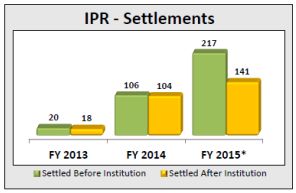The most recent IPR statistics have shown a sharp increase in the number of settlements, both before and after institution decisions, as revealed in the following chart.

What is most remarkable is the huge spike in settlements prior to institution. In fiscal year 2015, the number of pre-institution settlements (217) has more than doubled from the prior year and also has far outstripped the number of post-institution settlements (141), which were roughly equal the prior year (with 106 pre-institution settlements and 104 post-institution settlements).
Higher Settlement Rate May Be Lowering Institution Rate
Some commentators have noted that the rates of IPR institution and final decision invalidity have declined, but this may in part result from the large increase in settlements highlighted above, which are preventing an increasingly large share of IPRs from either reaching an institution decision or a final decision.
What Is Driving Higher Settlement Rate
What may be driving some of the increase in settlements is the early strong results for petitioners and the recognition on the part of patent owners that a majority of IPRs were ending unfavorably for patentees. A primary advantage of settling before institution is to avoid the institution decision, which itself can create a cloud of uncertainty over a patent. In a decision to institute IPR, the PTAB provides a carefully reasoned statement of why at least one claim is likely to be unpatentable, so the patent owner can avoid this by settling before institution.
If Parties Want To Settle
Filing a patent owner preliminary response after a petition for IPR is filed is one way to increase the amount of time available to reach a pre-institution settlement. If the 3 month period for filing the optional patent owner preliminary response expires without a response being filed, the PTAB may render a decision to institute sooner since it has no counter-arguments from the patent owner to consider. However, even if a patent owner preliminary response is filed, the PTAB may not always take a full 3 months to issue its decision. See Quillin et al., PTAB Average Time To Decision In IPRs May Surprise You. For this reason, parties will need to move as quickly as possible if they wish to settle prior to institution. Upon reaching an agreement to settle, parties may request confidentiality as to the settlement and file a joint motion to terminate the IPR. In general, the later the settlement is reached following an institution decision, the harder it may be to terminate the IPR (compare Sony Corp. v. Tessera, Inc., IPR2012-00033, Paper No. 39, in which termination was granted just prior to the final hearing, to Blackberry Corp. v. Mobilemedia Ideas LLC, IPR2013-00016, Paper No. 31, in which termination was denied just prior to the final hearing).
The content of this article is intended to provide a general guide to the subject matter. Specialist advice should be sought about your specific circumstances.


